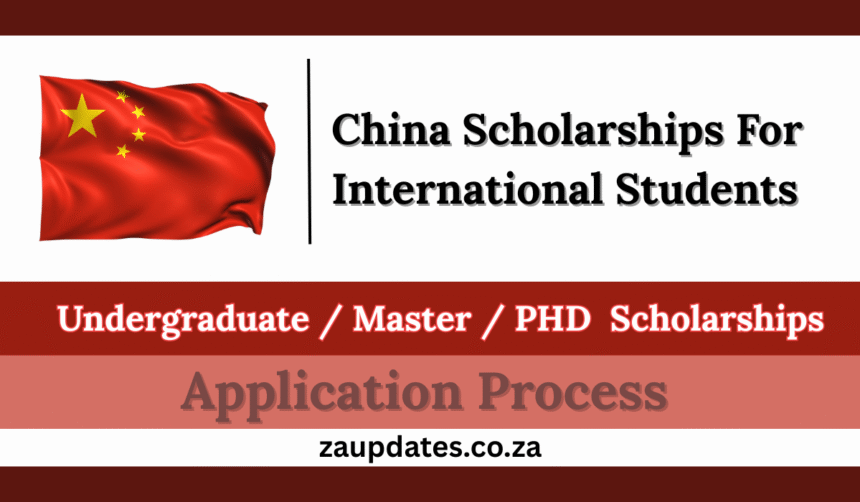China Scholarships For International Students 2026. A comprehensive guide to scholarships available in China is presented in this article for the academic year 2026. Although it requires considerable consideration before taking the plunge, I believe it is an opportunity that is well worth taking. Most Chinese scholarships will cover not only tuition and accommodation during your study period, but also a monthly allowance for living expenses during your study period.
Listed below are some clues to help you decide which scholarship will be most beneficial to you, as well as the steps and documents to apply for them. Best of luck to you and cheer up!
In China, what types of scholarships are available?
Scholarships to study at Chinese universities are most popular in the following three categories:
- Scholarships from the Chinese government
- Chinese Provincial Government Scholarships
- Scholarships offered by the Confucius Institute (official government entity for teaching Chinese to foreigners)
The scholarships offered in China are universal. Scholarships are available to citizens of almost all countries, depending on the educational agreements between them. Applicants for these scholarships are not required to meet a number of requirements. The economic endowments in the eastern country are quite generous due to the high cost of university education there.
Scholarships are available from a variety of sources, such as inter-university scholarships, scholarships from private organizations, scholarships from Chinese universities, and others offered by educational institutions in your country. For the purpose of this article, however, I will focus only on the most popular and universal scholarships in China.
Which type of Chinese Scholarship is suitable for me?
It’s a tricky question. The first question you need to ask yourself is what are you going to study? There are two options for you: study Chinese language (which results in a university diploma of advanced studies) or pursue a degree (Bachelor’s degree, Master’s degree, or PhD). It is important to consider the city in which you intend to study since that will also have an impact on the scholarship that you are offered.
To give you an idea, the entities that grant scholarships have agreements with many universities throughout the country (in China everything comes from or is connected to the government in some way). As a result, both government agencies providing scholarships, such as the Confucius Institute and various universities, are part of the government.
There are several scholarship quotas derived from these agreements that each financier grants to each university according to the type of course. Chinese government scholarships are available to students from all over the world, resulting in a very high level of competition.
This is why it is very important that, once you have determined what you are going to study and where you wish to study, you research the following points university by university:
- There may be scholarships available to study what you want (master’s degree, Chinese program, etc.).
- How many scholarships does each entity offer for the type of course you choose?
The research can be conducted online, but not all universities have published this information on their web pages (especially in the English version), so I recommend that you contact them directly by email. The sweep must be completed in order for you to be eligible to receive some scholarships in order to finance your studies in China.
I will now give you some clues about Chinese scholarships which, I hope, will guide you in finding the best Chinese scholarship for you. You may be interested in the Chinese Government Scholarship or the Confucius Institute Scholarship.
China Scholarships for Chinese Language Study
There are many foreigners who take Chinese courses at Chinese universities. It is a great idea if you are already studying the language in your country. You will see how your level advances exponentially, not like the minimal progress you sometimes see in your city. If you’ve never studied Chinese before, you can experiment to see if you enjoy it and are proficient. In five years of studying in the UK, I learned more about Chinese than my friends who studied in China for one year. However, that depends on the individual.
All three of the scholarships mentioned in the previous section accept Chinese language course students, with the Confucius Institute scholarship being the most oriented towards this purpose (it also offers grants for doctoral students and researchers, but these are not as popular). However, to be eligible for this scholarship, you must be a student of Chinese at one of the countless subsidiaries throughout the world in which you studied Chinese previously.
There is no requirement that you have previously studied Chinese to apply for scholarships from the national and provincial governments for a Chinese course. However, these scholarships are much more sought after, which makes them somewhat more difficult to obtain. As compared to both of these scholarships, the Chinese government scholarships award a greater number of grants for Chinese language studies at a greater number of universities. Some provincial governments, however, do not grant scholarships for Chinese study. Each university will need to be investigated separately.
Overall, I recommend that if you have already studied Chinese, you apply for the Confucius Institute scholarship to study Chinese in China. It is likely that they will award you the scholarship for the university of your choice if you meet all the requirements (I explain them in detail in the corresponding section).
A student who has never studied Chinese or has not been a student of the Confucius Institute must obtain permission either from the Chinese government or from the provincial government that corresponds to the city in which they wish to study. Since the first offer is wider, I advise you to request it since you will have a better chance of getting a scholarship at the college of your choice if you request the first offer.
Chinese Scholarships for Undergraduates and Postgraduates
Many people go to China to study undergraduate, masters or doctorates, whether in Chinese or English. Similarly to the previous case, you must first investigate which universities offer the courses you want to study and, second, check whether they offer scholarships to students with government funding (national or provincial). Get started by clicking here.
If this is clear, check with the university to see how many students are admitted to the Chinese government scholarship and the provincial government scholarship (this information can be difficult to find online). In this case, it is worth establishing a distinction: there are two ways to apply for the Chinese government scholarship (national). The first is possible through authorized agencies (such as the Chinese embassy in your country or certain international organizations in your area of membership, like the European Union, etc.), and the second is possible directly with the destination university.
The Chinese government can award scholarships through both routes, but they have different scholarship quotas. Similarly, if you apply through the Chinese embassy in your country, you will only be competing against other students of the same nationality. However, if you decide to apply directly to the destination university for the scholarship, you will compete against students from all five continents, since all universities accept applications from all over the world. As a result, and due to the lower scholarship quota awarded directly by Chinese universities, it is more complicated to obtain a Chinese government scholarship this way (if you are already in China).
Alternatively, there are scholarships offered by provincial governments. Applicants must deliver all documentation to their destination university in order to be considered for this scholarship. For this reason, you need to be in China to request them (you can also have someone do it for you or mail the documentation, but I would not recommend this last option).
There are not many candidates who are already in China when they begin their studies, which greatly reduces competition. If you do not want to study Chinese, provincial government scholarships require a Chinese or HSK diploma (normally 4 for a degree and 5 for a master’s or doctorate) before they will consider you for a scholarship.
The last requirement is very advantageous to those who already possess the necessary Chinese qualifications. There are not many people who speak such a high level of Chinese during the application period, and even fewer who are already in China. Play the card that gives you the best chances of obtaining a scholarship, based on your background and situation. If you do not speak Chinese and are living in your country of origin, I recommend applying for a Chinese government scholarship through the embassy in your country.
The scholarship also covers the costs of a Chinese language course of up to two years, so that you can follow undergraduate or postgraduate courses in Chinese. The applicants for an English-taught program will multiply exponentially, but you have the option to choose one. Having HSK4 or higher and already living in China gives you greater chances of receiving this funding if you apply for a provincial government grant. For the course you want to take, be sure to check if the university accepts scholarship students.
The following considerations need to be addressed:
- Remember, if you are applying to a prestigious university with a high ranking, it is likely to be the first choice for many people, which means you will be competing with more people.
- When applying for the two government scholarships, you should consider whether you would like full or partial funding (more information in the corresponding sections). A partial scholarship is much easier to obtain.
If you’re not clear anyway, I recommend you apply for as many scholarships as you can (if you meet the minimum requirements). Although you cannot receive two government scholarships during the same year (this applies to both the Confucius Institute and the government), you may apply to as many as you want, which increases your chances of receiving a scholarship.
Scholarships popular in China
The following guide will provide a comprehensive overview of the most popular scholarships in China. There is also a step-by-step procedure for applying for these scholarships.
1. Chinese Government Scholarship (CSC Scholarship).
Scholarships funded by the Chinese government finance undergraduate, graduate, and Chinese language education, as well as research stays throughout the country.
A Chinese government scholarship can be classified according to the type of funding it provides:
- Total or type A Scholarship: Approximately 350 and 500 USD per month for registration fees, accommodation (in a university residence room with another student), basic medical insurance, and a monthly allowance for personal expenses (between 2,500 and 3,500 Yuan per month).
- Partial or type B Scholarship: These usually include the same amount as the total scholarship, except for a monthly allowance for personal expenses.
- Type C Scholarship: This is another type of partial scholarship that includes some of the benefits of the total scholarship in an indifferent manner.
2. Chinese Provincial Government Scholarships
There are several types of scholarships that are awarded by provincial governments, including those sponsored by the four Chinese cities that are subject to central jurisdiction (Beijing, Tianjin, Chongqing, and Shanghai), since these cities are considered provinces in their own right.
There are scholarships available for undergraduate, master’s, and doctoral studies, as well as for Chinese language courses. It is important to note, however, that not all universities offer scholarships from the provincial government for all types of courses. Your case should be carefully reviewed.
The Chinese Provincial Government Scholarships will cover registration fees, room and board in a university residence (sharing a bathroom with another student), and health insurance coverage. It is also possible to receive a handsome amount of money for personal expenses per month when you are awarded a scholarship with full coverage.
3. Confucius Institute Scholarship (CIS)
The Confucius Institute scholarship is a very popular scholarship among students from all over the world. This organization was established by the Chinese government with the purpose of promoting knowledge of the Chinese language and culture throughout the world. There are numerous study grants offered by this organization each year to a total of 150 universities.
It also offers scholarships for specific doctoral studies, research stays, participation in international conferences, etc., however, in this section, I will exclusively focus on scholarships for Chinese language and culture courses, since they are in high demand.
The Confucius Institute’s scholarships cover tuition and living expenses (in a university residence, in a room shared with another person), basic medical insurance, and a monthly allowance for personal expenses.
4. Scholarships for high school students in China
The possibility of obtaining a scholarship for a year of study in a Chinese high school is also available, even though they are significantly less popular than the aforementioned scholarships. According to our knowledge, general scholarships are not available, therefore bilateral agreements between China and your country are your only option.
5. Postdoctoral Scholarships in China
There is a postdoctoral degree in the Chinese research system. This means that if you receive a postdoctoral scholarship, you must write a “postdoctoral” thesis and defend it in front of a faculty board. It is common for postdoctoral grants to be administered directly by universities or research institutes, so the requirements, procedures, and conditions can vary significantly. Detailed explanations of these points are provided below.
Characteristics of Postdoctoral Scholarships in China
- Amount of the scholarships: This will be determined by the province and university in which they are offered. The university usually provides financial assistance not only for the base salary, but also for housing rent, the possibility of renting an apartment at a very reduced price (with a private bathroom and kitchen), basic medical insurance (covers 75% of all medical expenses in public hospitals), and a deposit to buy a house (once you graduate). A monthly salary of 4,000 Yuan (including housing assistance) is typical.
- Number of scholarships awarded: There are a certain number of postdoctoral scholarships awarded at each university, especially in the areas of science and technology.
- Duration of the scholarship: Most postdoctoral scholarships last for two years, which is usually extended by a half-year or a year.
Note: A postdoctoral fellowship is not incompatible with other national and international scholarships, in fact, many universities offer programs to retain talent that subsidize the postdoctoral salary.
Minimum Requirements of Postdoctoral Scholarships in China
Most universities only require that you earn a doctorate degree, however, each university has its own requirements.
Documents Required for Postdoctoral Scholarships in China
- Application form duly completed: The University must provide you with the required documents.
- A letter of acceptance from the principal investigator is required.
- Official medical form or Foreigner Physical Examination Form: The form must be completed and signed by an accredited doctor (maybe from your country), and the official hospital stamp must be attached. You must stamp this stamp on the photo you are attaching.
- The doctorate degree. It may be necessary to submit a sworn translation into either English or Chinese if this document is not written in these languages.
- An English or Chinese-language research project.
- Please provide two letters of recommendation written in English or Chinese by a tenured or associate professor.
- Curriculum Vitae: A detailed description of publications and participation in conferences should be included in the CV.
Steps to Apply for Postdoctoral Scholarships in China
- Place of application: All documentation must be sent directly to the university or research center.
- Date of application: Most universities allow you to submit an application at any time.
- Application procedure: Different universities have different procedures.
NOTE: The information for applying for postdoctoral programs may not be well specified (usually only in Chinese) and you may even be required to submit documents partly written in Chinese. Therefore, it is important to get assistance from the destination research group if you need assistance.
This article will help you figure out which scholarships are the most popular to study in China as well as guide you in choosing the best scholarship. There are thousands of students worldwide who benefit from these grants every year, despite their complexity.
FAQs About
What types of scholarships are available for international students in China?
China offers several scholarship options for international students, including the Chinese Government Scholarship (CSC), Chinese Provincial Government Scholarships, and Confucius Institute Scholarships. These scholarships support undergraduate, postgraduate, and language studies and often cover tuition, accommodation, and living expenses.
Do I need to know Chinese to apply for a scholarship in China?
No, knowledge of Chinese is not always required. Many scholarships support programs taught in English. However, for courses taught in Chinese or for better scholarship chances (especially from provincial governments), having an HSK qualification (Chinese language proficiency) can be an advantage.
How can I increase my chances of getting a scholarship to study in China?
To improve your chances, clearly define your study goals, choose less competitive universities, meet the minimum eligibility criteria, and apply through multiple channels such as the Chinese embassy and directly to universities. Applying for both full and partial scholarships can also broaden your opportunities.
Conclusion
Studying in China on a scholarship is an incredible opportunity that combines financial support with cultural immersion. With options ranging from government to provincial and Confucius Institute scholarships, students can find funding for language, undergraduate, or postgraduate studies. Careful planning, timely application, and meeting eligibility requirements are key to securing your place in one of China’s prestigious universities.










